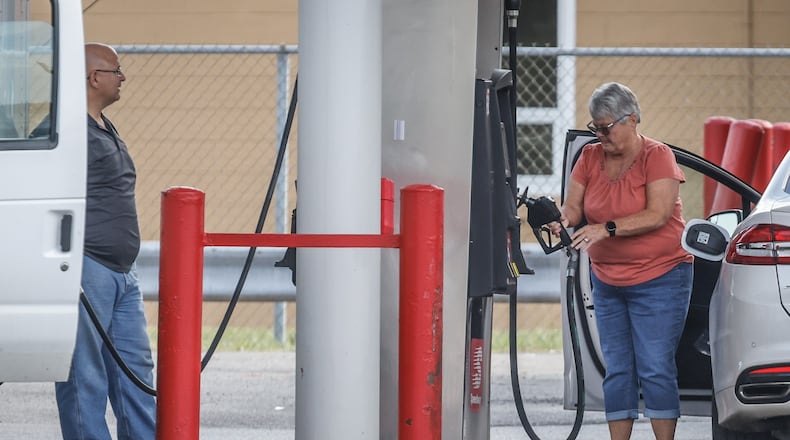In that AAA data, Dayton, Springfield and Cincinnati were up 29 cents, 26 cents and 28 cents, respectively, compared to a week earlier, and closing in on the $4 mark. They were up 5, 3 and 2 cents respectively Thursday, compared to the day before.
Prices at gas stations across the Great Lakes region, including Ohio, have jumped primarily because of “refinery kinks” that have occurred over the last month and a half, according to Patrick De Haan, senior petroleum analyst for GasBuddy, which tracks fuel prices.
A fire Sept. 20 at a Toledo-area refinery was preceded Aug. 24 by a fire at a Northwest Indiana refinery that is the sixth largest in the nation. Both incidents have “crimped supply substantially,” De Haan told this news outlet Thursday.
“That’s why you’re seeing prices that are now close to $3.99,” he said.
Gas demand increased nationally from 8.83 million barrels a day to 9.47 million barrel a day last week, and total domestic gasoline stocks decreased “significantly” by 4.7 million barrels to 207.5 million barrels, according to new data from the Energy Information Administration cited by AAA this week.
High gasoline demand, amid tight supply, has led to higher pump prices nationwide, according to AAA. The average gas price has increased to $3.87, rising 9 cents from a week ago and 4 cents from the day before.
Prices nationwide could continue to climb.
The OPEC+ alliance of oil-exporting countries decided Wednesday to sharply cut production to support sagging oil prices, a move that could deal the struggling global economy another blow and raise politically sensitive pump prices for U.S. drivers just ahead of key national elections.
Energy ministers cut production by a larger-than-expected 2 million barrels per day starting in November after gathering for their first face-to-face meeting at the Vienna headquarters of the OPEC oil cartel since the start of the COVID-19 pandemic.
De Haan said the good news is that there has been some improvement in the supply situation.
“Turns out, when prices skyrocket, Gulf Coast refineries like to send gasoline into the Great Lakes at the higher price, so we’re starting to see some relief in the wholesale price,” he said.
That is going to offset OPEC’s decision Wednesday to cut production 2 million barrels a day, De Haan said.
“It’s fairly nuanced, but areas of the West Coast and Great Lakes where gas prices have already surged 50 cents a gallon or more in the last couple of weeks, both of these (areas) are now starting to see wholesale gas prices fall as the situation improves,” he said. “So instead of OPEC’s decision actively continuing to drive prices up, there’s actually quite a bit of margin right now for the impact to be absorbed and even for prices to fall yet, because there’s been so much of a drop in wholesale prices.”
Prices are not going to come back down by $1 a gallon, but “instead they’ll come down 70 cents to 90 cents,” De Haa said.
Since last Thursday, the three states have seen the largest increases in their averages include Alaska (+38 cents), Illinois (+25 cents) and Ohio (+25 cents), according to AAA.
Ohio prices should start to inch down into the weekend and into next week, as long as there are no new refinery issues, De Haan said.
“You’re not going to see an impact in terms of gas prices going up at the pump from OPEC’s decision, rather, prices won’t fall quite as far,” he said. “The 10 to 30 cents a gallon impact that most of the nation will see at the pump is going to be offset in the Great Lakes and the West Coast because of an improvement in refinery conditions, so prices won’t fall as far now in Ohio as they would have if OPEC didn’t cut.”
Meanwhile, areas like the East Coast, Northeast, South and Rockies are going to more actively see that impact play out at the pump to the tune of 10 to 30 cents, De Haan said.
That’s because “prices never skyrocketed, so in those areas there’s no cover for the jump in oil prices because of OPEC’s decision,” he said.
Recent prices are “very off trend” on what is typically seen with gas prices in the fall, but there are a number of factors at work, according to AAA Club Alliance spokeswoman Kara Hitchens.
“Some of the impact has been short-term factors, such as Hurricane Ian hitting the Gulf,” she said. “That stalled some oil production, but some long-term factors such as the refinery fire in Toledo have had an impact on gas prices here in the Midwest.
“Reports are telling us that the refinery could be shut down for months, and now that OPEC has decided to cut production, it’s hard to know where prices will go from here.”
The price increases come after prices increased to record highs in June in the United States ($5.01 on June 14), Ohio ($5.06 on June 9), Dayton ($5.08 on June 8), Springfield ($5.07 on June 8) and Cincinnati ($5.09 on June 9), Hitchens said.
That was followed by the longest decline in average gas prices since the pandemic started in 2020, with 12 weeks of decline and prices falling to as low as $3.68 nationwide on average, $3.46 statewide, $3.36 in Dayton, $3.28 in Springfield and $3.50 in Cincinnati.
The Associated Press contributed to this story.
About the Author

